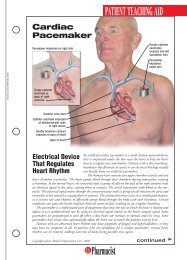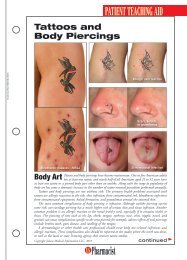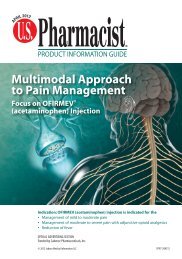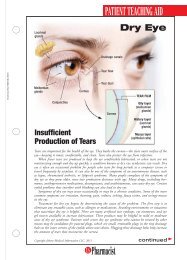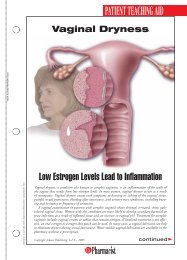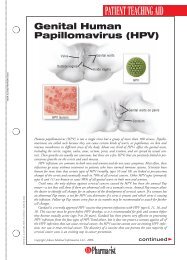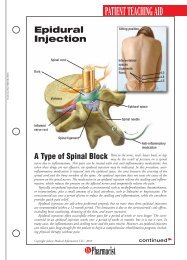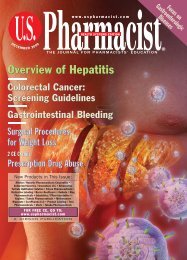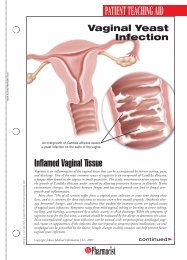View PDF Edition - U.S. Pharmacist
View PDF Edition - U.S. Pharmacist
View PDF Edition - U.S. Pharmacist
You also want an ePaper? Increase the reach of your titles
YUMPU automatically turns print PDFs into web optimized ePapers that Google loves.
Consult Your <strong>Pharmacist</strong>Fatigue and Drowsiness:Everyday Exhaustion and BeyondFatigue and drowsinessare a part ofeveryday life for millionsof people, and prolongedfatigue is a concern for10% to 25% of thosewho visit general practitioners.1 The high incidenceof fatigue is due tosuch issues as today’shectic lifestyle, lack ofleisure time, poor sleephabits, and certain medicalconditions. <strong>Pharmacist</strong>sare in an ideal positionto provide assistanceto patients complainingabout continual fatigueand daytime drowsiness.FatigueFatigue is commonlyexperienced and is thefeeling of tiredness orexhaustion that follows ahard day of work ormentally and physicallychallenging exercise. 2,3Patients may also complainthat they are weary,that their energy is gone,or that they feel lack ofmotivation to accomplishother tasks.Counseling PatientsWith Fatigue: Whencounseling patients withfatigue, the pharmacistW. Steven Pray, PhD, DPhBernhardt Professor, NonprescriptionProducts and DevicesCollege of Pharmacy, SouthwesternOklahoma State UniversityWeatherford, OklahomaCaffeine's stimulant effect is well known and is the primary reasonfor its ubiquitous use. The dose approved as safe and effective is100 to 200 mg, not more often than every 3 to 4 hours.© JUPITERIMAGESshould first attempt toascertain whether thefatigue is a normalresponse to overwork ora continual problem thatseems unrelated to theamount or extent ofeffort performed thatday, week, or month. Ifit is the former, theproblem is probably ashort-term, minor difficultythat will resolve onits own once the stressorshave subsided. However,if the patient is able tosleep normally but stillexperiences continualfatigue that seems unrelatedto ongoing mentalor physical stress, thefatigue may be secondaryto medications or a medicalcondition. 3 Forexample, patients withhypothyroidism complainthat they awakenrefreshed, but that activityresults in rapid onsetof fatigue. 3Causes of Fatigue:Fatigue can be caused bya wide variety of medicalconditions. 1,3,4 As manyas 40% of those reportingsymptoms of chronicfatigue were eventuallydiscovered to have a psychiatricor medical conditionthat had not yetbeen diagnosed but wasultimately treated successfully.4 Etiologiesinclude premenstrualsyndrome, premenstrualdysphoric disorder, allergicrhinitis, asthma, anemias,hypo- or hyperthyroidism,Addison’sdisease, fibromyalgia,arthritis, lupus, cancer,Parkinson’s disease, congestiveheart failure, diabetes,conditions causingpersistent pain, infections(e.g., AIDS, mononucleosis),renal disease,and hepatic disease. 4-8Depression and griefinduce fatigue. Sleep disorderscause fatigue,including insomnia, narcolepsy,and obstructivesleep apnea. Alcohol andother drugs of abuse(e.g., cocaine, narcotics)cause fatigue, and thepatient may find thatmaking healthier lifestylechoices will resolve theproblem. Malnutritionleads to fatigue, as doanorexia and other eatingdisorders. The wide spectrumof potential etiologiesmakes it critical forpharmacists to referpatients with unexplainedfatigue to a physicianfor a full medicalevaluation.Chronic FatigueSyndrome: Chronicfatigue syndrome (CFS)is a cause of chronictiredness that affects 1 to4 million Americans. 4 Itsramifications are profound,in that one-fourthof sufferers are notemployed and many arereceiving disability benefits.It differs from normalfatigue in its sever-12U.S. <strong>Pharmacist</strong> • November 2009 • www.uspharmacist.com



